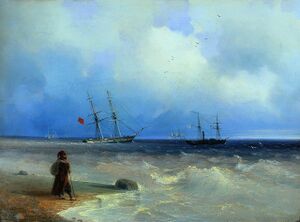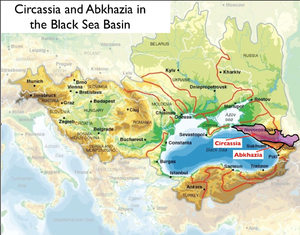The Vixen Incident
 | |
| Date | 1836 |
| Location | Black Sea, Circassia, Caucasus |
| Interests | • Crimean War • Circassia • Great Game • Henry Palmerston • Chechnya |
| Description | British agents on purpose let one of their ships transporting ammunition to tribes fighting Russia be captured, in order to provoke a greater conflict. |
| Participants | Russian Empire, Great Britain |
| Perpetrators | David Urquhart, Adam Czartoryski, James Stanislav Bell |
The Vixen Incident in 1836 was an episode where British agents on purpose made one of their ships transporting guns and ammunition to North Caucasus tribes fighting Russia be caught by the Russian navy, in order to provoke a war between the countries.
Contents
Russian Background
Under the terms of the Adrianople Peace Treaty (1829), the Russian Empire acquired the Black Sea coast in the North Caucasus, including Circassia[1]. However, control over these lands was not complete. The tribes who opposed the Russian authorities enjoyed the support of Britain, France, and exile Poles (Poland having been annexed by Russia in 1795/1815). They received weapons and ammunition from abroad. To stop these deliveries, on March 4, 1832, an instruction was issued for the Black Sea fleet, which stated:
""For preservation of the Russian possessions from infection and to prevent the delivery of military supplies to the mountain people, military cruisers will permit foreign commercial vessels only to two points – Anapa and Redoute-kale in which there is a quarantine and customs...." "
The UK regarded this as a violation of the principle of free trade.
British background
The story begins, oddly, in Egypt.[2] As a result of Muhammad Ali of Egypt's semi-rebellion the Turks were driven to sign the Treaty of Hünkâr İskelesi with Russia (1833). This threatened to make the Ottoman Empire a Russian protectorate. Under a secret article the Turks would close the Dardanelles to British and French warships while allowing Russian warships into the Mediterranean. This led to an anti-Russian agitation in England.
In 1834 British agent David Urquhart went to Circassia and made contact with the rebels. In 1836 he was captured in the Vixen. From 1837 to 1840 or later James Stanislaus Bell, Edmond Spencer and J. A. Longworth of the Times were also in Circassia. All three published memoirs. Their relation to the British government is uncertain. All four have been accused of offering the Circassians false hope of British support that probably would not have happened.
The provocation
In November 1836, the Russian military brig "Ajax" detained the British schooner "Vixen" in the area of the port of Sudzhuk-Kale (now Novorossiysk). At the moment of detention, 8 guns, 28,800 pounds of gunpowder, and a significant amount of other weapons had already been unloaded.
It was a provocation organized by the First Secretary of the British Embassy in Constantinople, David Urquhart. In addition to him, exile Poles, represented by Adam Czartoryski, took part in organizing the provocation. The crew, led by British agent James Stanislav Bell, received instructions to go to Sujuk-Kale, where a meeting with the Russian cruiser was almost inevitable. The owner of the schooner was instructed not to avoid her, but, on the contrary, to seek this meeting in every possible way.
Reaction in the United Kingdom and Russia
As the organizers of the incident expected, it was followed by a sharp deterioration in Russian-British relations, as the organizers of the provocation had hoped. Lord Palmerston categorically refused to accept the Russian explanations and told the imperial ambassador to England, Count Pozzo di Borgo, that Russia had no rights to the Caucasus.
The English press wrote that numerous corps of Russian troops had been thrown into the Caucasus, that their losses exceeded 1 million people, and similar things. Thus, public opinion was mobilized in support of the creation of the state of "Circassia".[3]
The conservatives raised in Parliament the question of the legality of the jurisdiction of the Russian Empire over Circassia. There were demands to threaten Russia with war, and to send the British fleet into the Black Sea. The actions of the Russian authorities were viewed as arbitrariness, gross enough to justify any retaliation. Parliament demanded to preserve peace through the threat of war and to ensure freedom of trade in the Black Sea through the presence of the British navy.
After angry statements from London, Nicholas I ordered the army and navy to be put on high alert. The schooner "Vixen", in accordance with the instructions, was confiscated, and her crew was sent to Constantinople.
The provocations continues
Meanwhile, provocations along the Black Sea coast continued. Bell went to Trebizond in April 1837, where he hired a Turkish felucca and bought a shipment of gunpowder worth 5 thousand piastres. On April 30, Nesselrode informed admiral Menshikov: “The ministry has learned that the merchant Bell, whose Vixen was captured by our cruisers, is leaving, accompanied by two persons, from Constantinople to Trebizond, in order to get from there by sea or dry road to the mountain peoples, and that he was supplied by the British ambassador to Constantinople with a passport to the Black Sea. Such a determined attempt by this person on the passage to the mountain peoples must undeniably conceal ill-intentioned plans, and therefore the emperor pleases that strict measures be taken to monitor his actions and to prevent him from carrying out hostile assumptions."[3]
Bell was not intercepted this time. In May, he secretly landed with the Circassians and again began to propagandize a war with the Russians, promising supplies of lead and gunpowder. The Briton even presented the Abadzekhs with a banner allegedly given to the highlanders by his monarch, and Longworth, who arrived with him, presented himself as an envoy of the king and parliament. To all appearances, they were clearly preparing allies on the Black Sea coast of the Caucasus for the event of a clash.[3]
Consequences

The conflict threatened to escalate into a war between the Russian and British empires, but by April 1837 it was settled. Urquhart was recalled to London. Britain was unable to find a continental ally for the war with Russia. In the official response of the government and the Liberal Party to the Conservatives' request, it was noted that Russia owned Circassia legally, according to the Adrianople Peace Treaty.
Russia continued the patrolling of the eastern coast of the Black Sea.
On May 2, 1837 Palmerston declared to Russian ambassador Pozzo di Borgo: "England must fulfill its role as the patroness of the independence of nations, and if the sheep are silent, then the shepherd must speak." Moreover, with surprising frankness for himself, the British Foreign Secretary admitted that "he hid in the depths of his heart and developed a plan for a crusade against Russia, saying that the emperor was threatening the universe. Thus, he said that the universe should turn against His Majesty."[3]
The actions of the British were not in vain. After the agents' visit to the tribes, the latter's determination to continue the war was strengthened. As a result of the Vixen case, both sides of the conflict retained their positions on the issue of trade navigation in this area of the Black Sea, but avoided a break. Nevertheless, the Vixen incident showed for the first time the real possibility of a conflict between London and St. Petersburg in the Black Sea region.
The conflict became one of the significant episodes of the Russian-British rivalry in the 30s-40s of the 19th century, which led to the Crimean War.
Known Participants
All 2 of the participants already have pages here:
| Participant | Description |
|---|---|
| Russia/Tsarist Russia | |
| UK | The biggest Island in Europe. It was a world power with massive influence for over 4 centuries. |
Rating
References
- ↑ http://blackseafleet-21.com/news/21-11-2013_postavim-na-svoem-bez-draki-delo-viksena-i-bolshaja-igra-na-kavkaz
- ↑ Walter Richmond, The Northwest Caucasus, 2008, Chapter 4
- ↑ a b c d http://blackseafleet-21.com/news/21-11-2013_postavim-na-svoem-bez-draki-delo-viksena-i-bolshaja-igra-na-kavkaz
